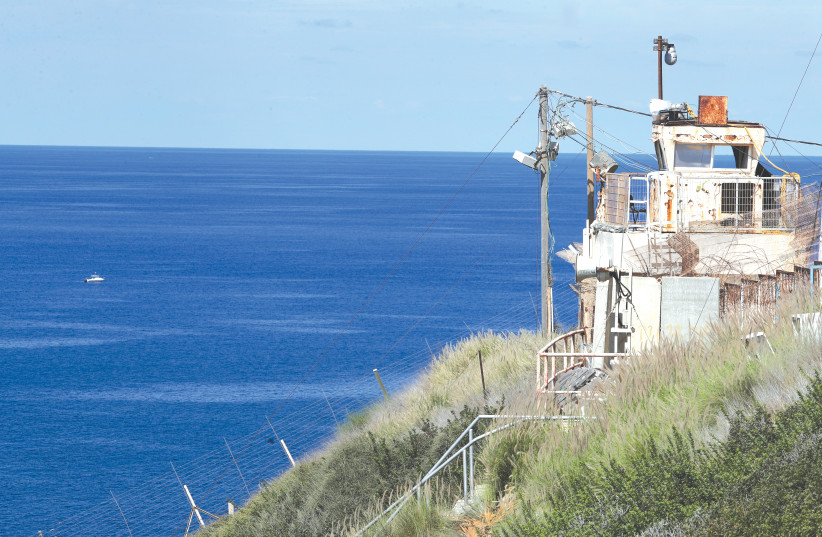In recent months, Israel has been negotiating to settle maritime border registration with Lebanon. This negotiation, which has known difficulties – and included new and illogical demands from the Lebanese side – is apparently nearing its end with a very good possibility that the agreement will be approved in the coming weeks.
At the same time, Hezbollah threatens Israel with the possibility of military action, most likely against a naval target, and in particular, against the Karish gas rig located offshore Israel, in the eastern Mediterranean Sea. Hezbollah Secretary-General Hassan Nasrallah has recently threatened several times to carry out military action against Israel if Jerusalem is not willing to reach an agreement with Lebanon that will satisfy the Iran-backed Lebanese terrorist group.
On the one hand, Hezbollah is not interested in a large-scale war against Israel, due to the Israeli deterrence that was achieved back in the Second Lebanon War in 2006, and due to the threats of senior Israeli officials to return Lebanon to the Stone Age and to widely attack civilian infrastructure in the country.
On the other hand, Hezbollah is interested in strengthening its image as the defender of Lebanon and the real entity that safeguards Lebanon’s political, security and economic interests. Hence, there is a real possibility of escalation between the parties, and Israel, including the IDF, takes the threats of Nasrallah as seriously as possible.
It is possible that in the absence of an agreement in the coming weeks that would regulate the maritime borders between Israel and Lebanon, Hezbollah would be interested in a few days of fighting against Israel, but in a limited way. The IDF in its part has already thickened the defense systems around the Karish gas rig, including the placement of special sensors that will warn against hostile actions.

In recent years, the IDF has conducted a series of extensive military exercises and training simulating an escalation in the north and the possibility of a war with Hezbollah (and even a multi-front war against other terrorist organizations). For example, last May the IDF conducted one of the largest and most extensive military exercises in recent years, Chariots of Fire, which lasted for a month and included training of infantry and special forces on the soil of Cyprus, whose area is similar to the area of southern Lebanon. The purpose of the exercise was to prepare for war against Hezbollah, including a ground maneuver many kilometers deep in Lebanese territory.
A fundamental threat to Israel
HEZBOLLAH IS the most serious fundamental threat to Israel in the Middle East region. Its military power is significantly stronger than Hamas and even other armies in the region. The IDF scenario for a war against Hezbollah includes hundreds of dead civilians and soldiers, and severe damage to buildings and infrastructure throughout Israel. This is because of Hezbollah’s ability to launch thousands of rockets in a short period, over many days, with greater precision and firepower than Hamas, for example.
The Iran-backed Lebanese terrorist group possesses approximately 45,000 short-range rockets of up to 40 km (not including mortar bombs) in addition to approximately 80,000 medium and long-range rockets, dozens of which are accurate. According to current IDF estimates, approximately 1,500 rockets will be launched each day of fighting on average from the territory of Lebanon.
In addition, Hezbollah is expected to use the Radwan Unit – a special ground maneuver force, whose mission is to penetrate Israeli territory (among other ways through terrorist tunnels) and try to take over an Israeli settlement, kill civilians, kidnap soldiers and disrupt supply lines or movement of IDF forces. Hezbollah also owns a fleet of unmanned aerial vehicles and explosive drones. On top of that, Hezbollah is expected to use advanced anti-tank and anti-ship missile launch systems.
According to reports, senior officials in the defense system claimed in a hearing before the Ministerial Committee on National Security Affairs that if Israel does not reach an agreement on the registration of maritime borders with Lebanon by the start of gas production at the Karish rig in September, the chances of an escalation with Hezbollah are very high.
There is a reasonable possibility that the current government led by Prime Minister Yair Lapid – who has no security background and experience, and as such is more attentive to the recommendations of the security professional echelon – will show excessive flexibility and make territorial concessions beyond what is required, just to avoid the possibility of war in the north.
However, the state of Israel must avoid too many and too large concessions vis-à-vis Lebanon, just because of Hezbollah’s threats. In order to strengthen deterrence and weaken Hezbollah’s image in Lebanon and the entire region, it would be worthwhile for Israel to deliberately postpone the approval of the agreement on the maritime registration with Lebanon after the start of gas production. Thus, in order to show that Israel will not submit to Hezbollah’s dictates.
At the same time, Israel must threaten Hezbollah and Lebanon that if Hezbollah does a provocation and tries to damage the gas rig or try to harm any other Israeli target, Israel’s response will be disproportionate and will not be limited to a few days of warfare, but will lead to the start of a large-scale war in Lebanon.
The writer, a PhD, is a military strategy and national security expert, and a researcher at the Jerusalem Institute for Strategy and Security (JISS).
